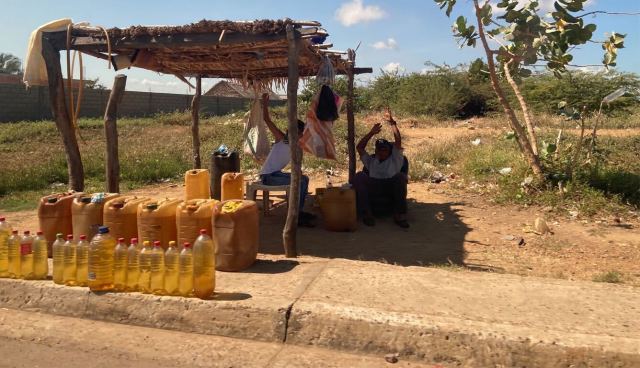
The black market for gasoline is quickly disappearing in Venezuela’s oil-rich state of Zulia as changing government policies and supply increases chip away at one of the state’s biggest criminal economies.
By Insight Crime
Apr 12, 2023
Gas stations in the northeastern state maintained short, orderly lines when InSight Crime traveled to Zulia’s capital earlier this year. Obtaining fuel required no covert stops at the houses of black-market vendors, known as pimpineros, nor were their stalls anywhere to be found.
The situation stood in stark contrast to May 2022, when InSight Crime observed gas station queues spilling onto highways as fuel shortages halted public transport and threatened food distribution. Pimpineros hocked contraband fuel in plastic soda bottles on street corners throughout Zulia’s urban centers.
Historically, the estimated profits from Venezuela’s contraband gasoline have ranged from millions to billions of dollars annually, even accounting for quickly shifting prices and the absence of official data. Zulia, a state with bountiful oil reserves and the country’s most populous, represented one of this economy’s biggest markets.
But the black market started to implode late last year when Zulia’s state government began phasing out fuel subsidies, turning control of most gas stations over to civilians, and finding ways to bring more oil into the state.
Subsidized Gas Stations Disappear
Over the last year, authorities have started phasing out subsidized gasoline stations — which fostered the state’s contraband fuel economy — and replacing them with unsubsidized stations. The longstanding promise of nearly free gasoline is being eroded, and with it the contraband fuel economy.
For years, the country’s heavily subsidized gasoline was sold to Venezuelans at a fraction of a cent per liter — and smuggled in huge quantities across the border into Colombia, where it could be resold for as much as a hundred times the price.
But Venezuela’s oil industry has suffered colossal production declines in recent years due to underinvestment, corruption, and other problems. As gasoline shortages became desperate, the government began rationing subsidized fuel, eventually forcing some stations to shut down altogether. Lines stretching 200-300 cars deep formed in front of the remaining subsidized stations, and it was common for gasoline to run out before those waiting could reach the pump.
Pimpineros began taking advantage of the shortages by filling up their tank with subsidized fuel, then reselling it at a profit. This created a second — domestic — black market operating in parallel to the continuing cross-border smuggling into Colombia.
But over the last year, the dwindling number of subsidized gasoline stations has cut off pimpineros’ source of cheap fuel, undermining the economic foundation of Zulia’s gasoline black market.
New Government, New Rules
Zulia’s governor, Manuel Rosales, dealt the state’s gasoline black market another blow by giving control of fuel distribution almost entirely to private citizens instead of security forces.
Rosales, elected in 2021 as part of the political opposition to the ruling United Socialist Party of Venezuela (Partido Socialista Unido de Venezuela – PSUV), has disrupted networks formed by corrupt security officials, primarily though not exclusively, from the Bolivarian National Guard (Guardia Nacional Bolivariana – GNB).
Previously, the GNB oversaw gasoline delivery to Venezuela’s service stations. This gave high-level officials the opportunity to divert subsidized gasoline directly to the black market, usually sending it across the border to Colombia by the truckload.
The graft compounded Zulia’s fuel shortages, as corrupt officials continued to divert gas to the black market despite the shortfall in supply.
Meanwhile, lower-level police and military officers used their control over gas stations to charge regular Venezuelans, as well as pimpineros, for access to the subsidized pumps.
“Many of us made deals with police or military officials and paid them to get into the gas station, when there were lines, or to fill up more than the allowed amount,” one former pimpinero, who did not want to be identified for legal reasons, told InSight Crime.
Another former pimpinero, who also requested anonymity, said they could pay police or military officials to allow them to fill up canisters at the pump — a practice that is technically illegal in Venezuela.
Rosales and his municipal allies have changed this dynamic by placing control of gas stations in the hands of civilians.
“The police and military … are losing their shit, saying, ‘What the fuck?’ They don’t know what [hit them],” said the ex-pimpinero.
Increased Supply
Authorities in Zulia have also reportedly struck a deal with the national government to bring more gasoline to the state, alleviating extreme fuel shortages that had made the state’s gasoline black market essential for its survival.
Sources familiar with the matter say that Rosales struck a deal with the central government in Caracas to bring more fuel to Zulia, even though Venezuela’s oil infrastructure remains in ruins.
“At the end of [2021] or the beginning of 2022, the most that arrived was a truck of fuel a day. Today each station receives two to three tankers,” Juan Carlos Caldera, a National Assembly representative for Zulia, told InSight Crime.
But many sources also told InSight Crime that much of the increased supply is coming from Iran, which has boosted the amount of crude it ships to Venezuela despite sanctions.
While Irán’s heavy crude has relieved demand pressure, Iván Freites, the former president of the petroleum workers’ union in Venezuela, told InSight Crime that Zulia’s dilapidated refineries were not built to process it, and doing so damages the machinery, causing fires.
Overall, Freites sees Zulia’s newfound fuel stability as precarious. “It’s a bubble. It can end at any time,” he said.
If shortages do return, the black market will be waiting. “I wouldn’t rule out that at some point pimpineros get back into the ring,” a third former pimpinero, who also requested anonymity, told InSight Crime.
…
Read More: Insight Crime – Inside the Evaporating Black Market for Gasoline in Zulia, Venezuela
…

